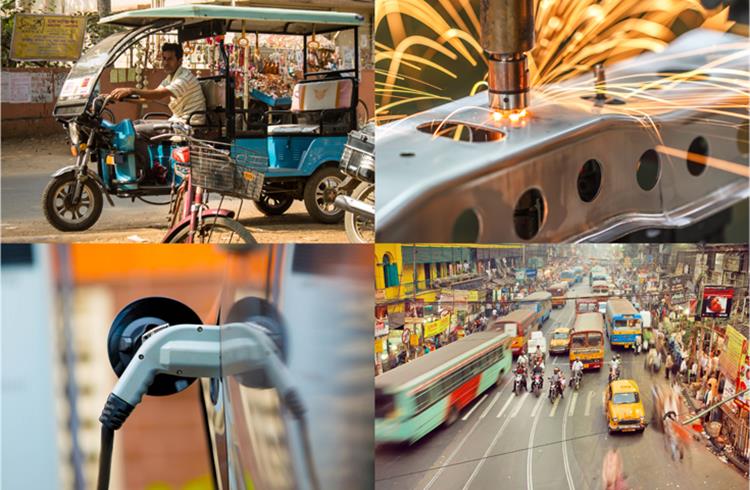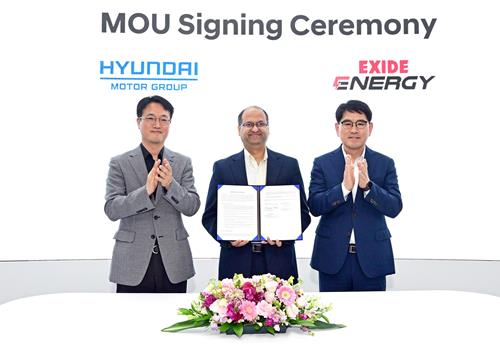Incentivise EVs on usage instead of purchase cost, say WEF and Ola Mobility Institute
The study finds that there are ten States and Union Territories who are building momentum for EV usage in India.
Following a strong Central government push towards electric vehicles (EVs), India has the potential to become one of the largest EV markets in the world, says a report released by the World Economic Forum (WEF), the global organisation for public-private cooperation and the Ola Mobility Institute.
The study finds that there are 10 States and Union Territories in the country which are building momentum for EV usage across three areas: manufacturing, infrastructure and services sectors. Given India’s role as part of the global big four automotive players (among US, China, Japan), large-scale changes to the Indian market would impact the industry’s global footprint.
The report titled 'EV Ready India - Part 1: Value Chain Analysis of State EV Policies' examines programmes and policies in Andhra Pradesh, Bihar, Delhi, Karnataka, Kerala, Maharashtra, Tamil Nadu, Telangana, Uttarakhand, and Uttar Pradesh. It highlights the possibilities for the sector and builds a common framework for analysing state EV policies through trend analysis of value chains.
Long-term investment in R&D needed for sustained growth
Christoph Wolff, Head of Mobility, World Economic Forum said: “With many more states in the process of designing their EV policies, policymakers, businesses, and practitioners alike can use this framework to analyse state policies for sustainability and longevity. The role of government is crucial for accelerating adoption. Right now, the uptake of electric vehicles is slow due to the high-upfront cost and range anxiety. But, long-term investment in R&D will create sustained growth.”
Anand Shah, Head, Ola Mobility Institute said, "India has taken up an ambitious target to become a $5 trillion (Rs 35,430,000 crore) economy by 2025. The country has placed equal importance on growth that is environmentally sustainable. Mobility holds significant promise for India to enable low-carbon solutions. OMI, in partnership with the World Economic Forum, intends for this framework to support the country’s readiness to go electric.”
Trends in India
While the approaches vary amongst these states and territories, the report highlights three emerging trends. The first is that most states aspire to be manufacturing hubs for EV and EV components. Production of clean-fuel batteries, recycling and storage are incentivised across the board. This aligns well with the national 'Make in India' agenda and can provide case studies for how to roll out similar production facilities. For example, the Uttar Pradesh and Maharashtra EV policies emphasise heavily on promoting EV manufacturing.
The second trend, infrastructure development, was largely a response to anxiety around the range of EVs, with most state having provisions for installations of charging infrastructure in public and private places. Uttar Pradesh is targeting 200,000 charging stations by 2024. Andhra Pradesh is targeting 100% electrification of buses by 2029.
The third trend is an emphasis on the services the EV value chain can provide through public awareness. These include skilling programmes in Tamil Nadu, fiscal incentives in Maharashtra and non-fiscal incentives like retrofitment services in Telangana. These are all examples of how states and territories try to connect the consumers and manufactures.
Incentivisation
Fuelled by the national agenda of electrification and bolstered by government-led initiatives, the public and private sectors alike have commenced their respective and joint transitions to electric mobility. But, the uptake of electric vehicles has been slow; vehicles are costly not only upfront but also on a lifecycle cost basis. In order to overcome these challenges, R&D must be stimulated by setting up funds for research centres and centres of excellence. This would lend to strong manufacturing base. Given the nascent market, the role of government is crucial for accelerating adoption, diffusion and deployment of electric mobility.
“For a price-sensitive market like India, developing incentives for electric (clean) kilometres run versus electric vehicles purchased makes economic sense and is suggested to be the guiding principle for the national strategy,” added Wolff.
RELATED ARTICLES
IIT Bombay inaugurates Arun Firodia Research Floor
IIT Bombay, one of India’s top technical and research institutions, honours Kinetic Group chairman Dr Arun Firodia, one ...
Maruti Suzuki expands capacity at Manesar plant by additional 100,000 units
New assembly line at Plant A expands total manufacturing capacity at the Manesar plants to 900,000 units per annum. Alon...
Hyundai and Kia partner Exide Energy to produce LFP batteries in India
Partnership with Exide Energy enables Hyundai Motor and Kia to equip future EVs in the Indian market with locally produc...





 By Autocar Pro News Desk
By Autocar Pro News Desk
 03 Oct 2019
03 Oct 2019
 4709 Views
4709 Views









